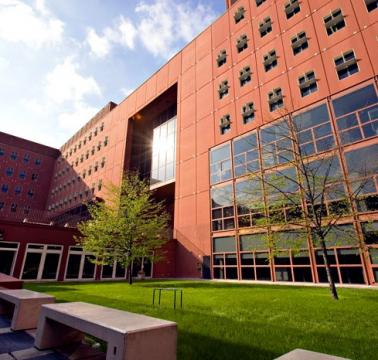About us
We are one of the eight departments of excellence in physics at the national level for the years 2023-27, one of the eight excellent university departments with the BICoQ project, the Bicocca center for Quantitative Cosmology, focused on fundamental research, which involves the study of the fundamental components of the universe, cosmology, theoretical physics, and experimental physics.

The Department of Physics of Milano-Bicocca University exists since 1997. It is named after Giuseppe (Beppo) Occhialini, the co-discoverer of the positron and of the pion.
The Department currently consists of about 100 faculty and researchers, and 17 technicians, active in many of the main fields of physics research, in collaboration with researchers, technologists, and technicians from INFN, as well as around a hundred PhD students and an equal number of postdoctoral fellows and scholarship holders.
They area active in many of main topics of reasearch in Physics:
- Theoretical Physics: quantum field theory, phenomenology of fundamental interactions, statistical physics, computational physics, string theory;
- Particle Physics: experiments on fundamental interactions as part of international collaborations (high-energy colliders at CERN; neutrino physics at Gran Sasso); measurements in particle physics relevant for astrophysics; measurements of neutrino masses;
- Astrophysics and cosmology: experiments on the cosmic microwave background and on the distribution of antimatter in the universe; earth- and space-based observations at millimeter, sub-millimiter and infrared wavelengths;
- Biophysics: experiments on the dynamics and shape of biomolecules, analysis of single proteins and DNA with optical and pulsed-laser microscopy;
- Plasma Physics: experiments on nonlinear and chaotic phenomena in plasmas, turbulence and transport in magnetized plasmas, plasmas produced by lasers, magnetic and inertial fusion;
- Electronics: Design of integrated circuits for physics and astrophysics experiments.
- Quantum Technologies: study and application of the principles of quantum mechanics to the development of new technologies for information and measurement. The field includes the design and realization of qubits, parametric amplifiers, and innovative quantum circuits, capable of providing a quantum advantage both in computation and in measurements for fundamental physics. Activities include qubit engineering, implementation of quantum algorithms, and the use of entangled or squeezed quantum states to overcome the limitations of classical technologies.
- Applied Physics: applications of the concepts and methodologies of physics to environmental measurements, medical diagnostics and therapy, cultural heritage, study of nuclear reactors and neutron fluxes, development of new radiation detectors, and analysis of trace elements.
There are applied physics activities in all these research sectors:
- parallel computing and computational physics;
- environmental radioactivity;
- industrial uses of plasmas;
- neutron spectroscopy;
- criogenic and low-noise instruments.
There are also collaborations with other Departments at Milano-Bicocca University, and with several Italian and international Universities and Laboratories, such as: CERN, Gran Sasso, LN-Frascati, Osservatorio di Brera, DESY, Fermilab, MPI, Efda-JET.
The department has several research grants, coming from the Italian Ministry of Research (MIUR), from several Research agencies (INFN, CNR, ASI, INAF), from the Europen Union and from industries.